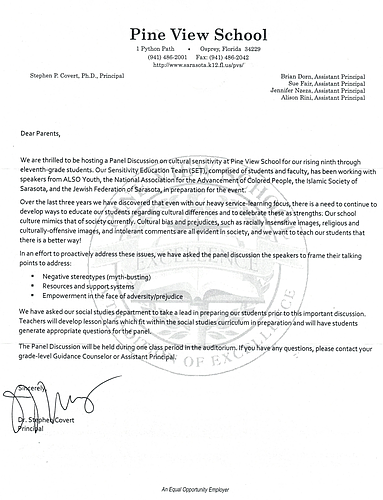- December 23, 2024
-
-
Loading

Loading

What is a public high school principal to do?
Put yourself in those shoes.
Every high school principal’s students see the world roiling. Go down the list — terrorism; immigration; assaults on freedom of speech and religion; racial and religious wars; the strident clashing — sometimes physically — of political philosophies; ad infinitum.
And in the halls of an American high school, it’s most likely a cultural melting pot, a mimic of society at large. Perhaps its own cultural tinder box.
How do you keep it from exploding?
One of the standard answers in this PC era is to teach our youth to “celebrate our diversity” and “embrace our differences.”
At Pine View School in Sarasota, Stephen Covert, the principal, says one of the missions is to teach the students without indoctrinating or advocating. “We are very mindful of educating without advocating,” he told us.
To help navigate this minefield of cultural IEDs, Pine View, which is one of Sarasota County’s top-performing elementary, middle and high schools, has what it calls a “Sensitivity Education Team,” consisting of high school students and faculty. Recently, the team scheduled a panel discussion on “cultural sensitivity” for the school’s ninth through 11th grade classes.
Turns out, the sensitivity team wasn’t as sensitive as it should be. The Sarasota County School District has postponed the session for next fall. Here’s why:
In a letter to parents announcing the panel discussion (see letter), Covert said the sensitivity team had been working with speakers from the National Association for the Advancement of Colored People; the Islamic Society of Sarasota; the Jewish Federation of Sarasota; and ALSO Youth, a support organization for lesbian, gay, bisexual, transgender, questioning, intersex and asexual youth (LGBTQIA).
But when some parents read the letter, they saw the obvious omission. One parent wrote to School Board member Bridget Ziegler:
“We are thrilled that our daughter will be participating in this discussion; however, we believe that open dialogue would be inclusive of all religions/faiths. Our country was founded on Christian principles, and we do not feel that omitting Christianity from the panel discussion is educating students of all cultural differences. It seems a bit like reverse discrimination, and Christian stereotypes should be part of the discussion.”